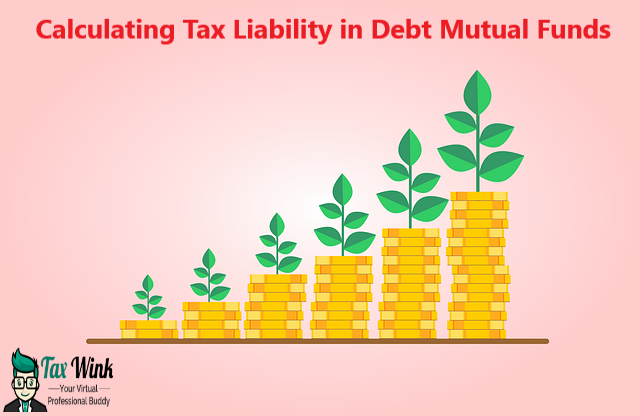How to calculate Tax liability in Debt Mutual Funds

Introduction:
Mutual Funds have become one of the most attractive investment avenues for young investors as these not only save taxes but also yield high returns with lower risk to the investors. The returns given by the mutual funds also surpass the return generated by the Sensex (BSE/NSE) because of the fact that the mutual funds are managed by experienced fund managers and backed by a team of stock researchers. People are often confused about investing in equity and debt-oriented mutual funds. This decision is entirely based on the risk appetite of the investor. Our article is focussing only on the taxation implications of investing in mutual funds with a basic understanding of mutual funds. Let’s read
How do You earn Returns in Mutual Funds?
This is the most important question every investor asks before making an investment in mutual funds. Investment in mutual funds will give you a return in two forms:
- Dividend
- Capital Gains
Mutual Funds are like collective investment schemes where they collect funds from a large number of investors and invest in quality stocks & debt instruments. The profits derived from such investments are distributed in the form of dividends by the mutual funds amongst the investors in the proportion to units held by them. This counts as income for the investors. Besides this, the investors can earn capital gains when they sell their mutual fund investments at a price higher than their cost price. Both the Dividend and capital gains are taxable in the hands of the investor. You should declare these incomes while e-filing of income tax return.
Tax on Dividend Income from mutual funds
Earlier, the dividend income was entirely exempted in the hands of the investors as the companies/ mutual funds were obliged to pay dividend distribution tax on the dividend declared by them. However, a recent amendment made in the Income Tax Act has now made its taxable income for all taxpayers. You are now required to add dividend income to your other taxable income while doing ITR filing and pay tax at the applicable slab rates.
Read More on Tax on Dividend Income
Tax on Capital Gains Income on Mutual Funds
The tax treatment of capital gains on mutual funds depends upon the type of mutual fund and the period of holding. ‘Period of Holding’ means the time period between the sale date and purchase date of mutual fund units. For better understanding, we would first understand the types of the mutual funds as below:
What are Equity Funds?
Equity Funds mean those mutual fund schemes which invest a majority of their funds in equity shares of companies. The returns generated by equity funds depend upon the performance of the stock market and that of the invested stocks. Equity Funds generally give higher returns to the investors as compared to debut funds. However, equity mutual funds are subject to higher risk due to market volatility.
What are Debt Funds?
Debt Funds are the mutual funds that invest majorly in the debt securities such as bonds, debentures, government securities, etc. These carry fixed returns for the investors with lower risk. Debt Funds are suitable for those investors who are having lower risk appetite. But the investors should be aware of the fact that these funds give lesser returns as compared to equity funds.
Income Tax on Equity Funds
As already discussed, the tax implication in the case of mutual funds depends upon the period of holding the investments. According to the period of holding, capital gain on equity funds can be of two types: Long-Term Capital Gains (LTCG) & Short-Term Capital Gains (STCG)
Long Term Capital Gains on Equity Funds |
Short Term Capital Gains on Equity Funds |
|
|
Note: Applicable surcharge & cess is also chargeable in addition to the tax at the above rates.
Income Tax on Debt Funds
Debt Funds are also subject to capital gains tax either as ‘Long Term Capital Gains Tax’ or ‘Short Term Capital Gains Tax’. Read carefully…
Long Term Capital Gains on Debt Funds |
Short Term Capital Gains on Debt Funds |
|
|
Conclusion: The decision to choose between equity and debt funds depends on the risk appetite of the investor and such a decision should be based on the economic scenario to some extent also. Whatever is the decision of the investor, he should try to stay for a longer term in the investments in mutual funds to not only increase his returns but also reduce his tax burden.
For ITR filing services online, connect at 9660930417



